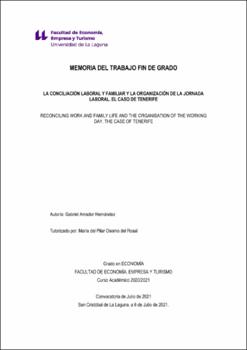La conciliación laboral y familiar y la organización de la jornada laboral. El caso de Tenerife.
Author
Amador Hernández, GabrielDate
2021Abstract
El objetivo de este trabajo es ofrecer una perspectiva reciente de diversos aspectos relativos a la
conciliación familiar y laboral y mostrar cuál es la situación actual en Tenerife en esta materia. Con
este fin, se ha revisado legislación e informes de distinto tipo y, además, se ha realizado una
encuesta en la que se pregunta sobre esta problemática. Entre las conclusiones alcanzadas cabe
señalar la preocupación por la conciliación tanto a nivel político como social, si bien no se ha
avanzado lo suficiente en este aspecto. Así, aunque haya una mayor flexibilidad en términos de
organización de la jornada laboral que antes, la jornada completa dificulta la conciliación. Las
mujeres son las más perjudicadas porque se siguen encargando mayoritariamente del cuidado de
otras personas. Específicamente, la atención a los hijos es una dificultad importante, ya que, al
menos en Tenerife, no hay suficientes guarderías públicas. The aim of this paper is to offer a recent perspective on various aspects related to work-life balance
and to show the current situation in Tenerife in this area. To this end, different types of legislation
and reports have been reviewed and, in addition, a survey has been carried out in which questions
have been asked about this issue. Among the conclusions reached, it is worth mentioning the
concern for work-life balance at both political and social levels, although not enough progress has
been made in this area. Thus, although there is greater flexibility in terms of the organisation of the
working day than in the past, the full working day makes work-life balance more difficult. Women
are the most disadvantaged because they are still mostly responsible for caring for other people.
Specifically, childcare is a major difficulty, since, at least in Tenerife, there are not enough public
nurseries.





